Our live coverage of Israel's war against Hamas in Gaza has moved here.
April 6, 2024 Israel-Gaza news
By Heather Chen, Sophie Tanno, Adrienne Vogt, Tori B. Powell and Matt Meyer, CNN
UK deploys Navy to boost Gaza aid through new maritime corridor
From CNN's Mia Alberti
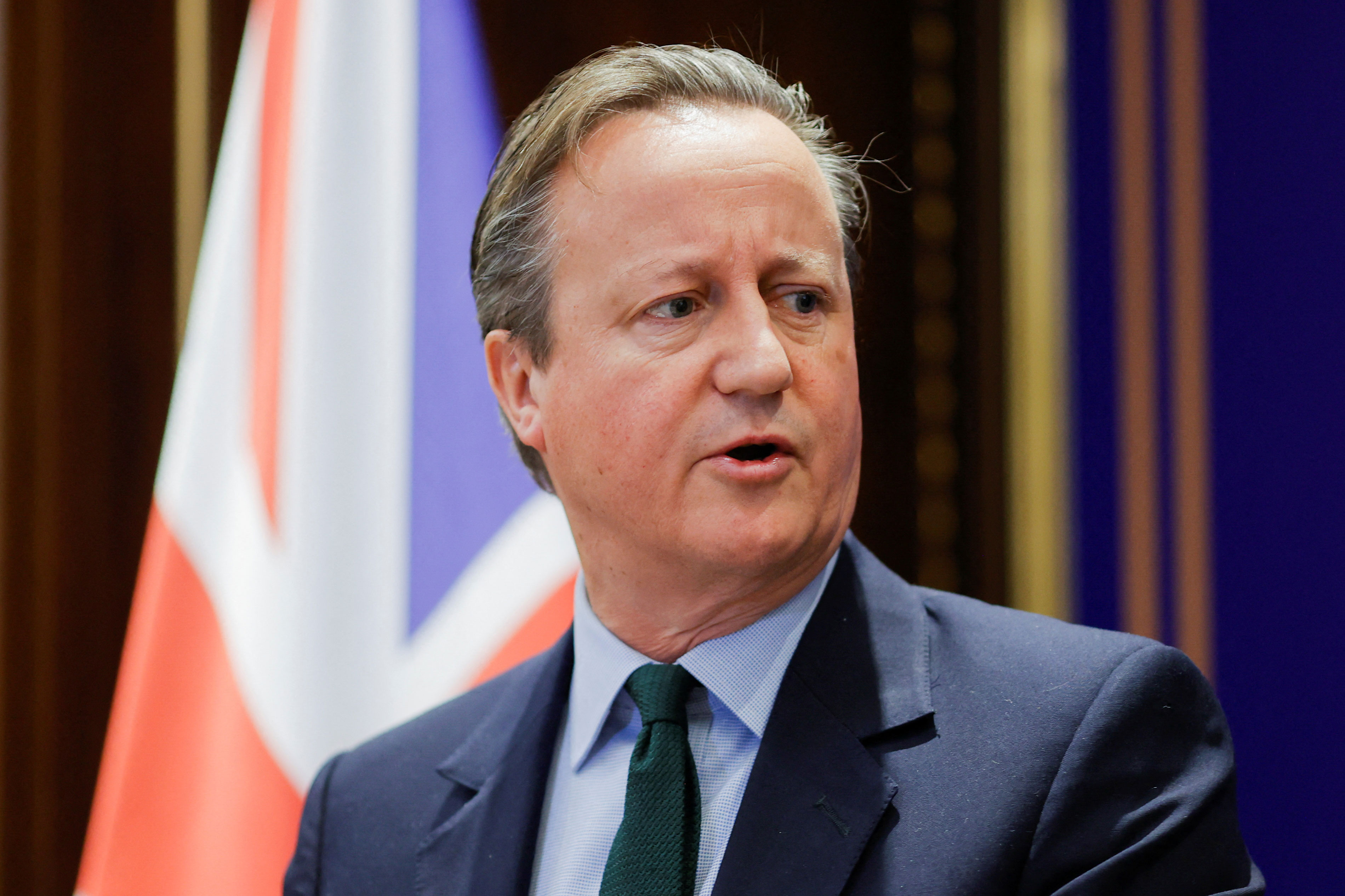
The UK has deployed a Navy ship to boost aid through Gaza as it joins international efforts to set up a new maritime corridor from Cyprus, British Foreign Secretary David Cameron said in a statement on Saturday.
“The situation in Gaza is dire and the prospect of famine is real. We remain committed to getting aid to those who so desperately need it," Cameron said.
Joining efforts with the US, Cyprus and other partners, the UK is setting up a new temporary pier off the coast of Gaza to get aid in, according to Cameron.
The corridor is expected to be operational in early May. It will allow for the delivery of "tonnes of aid pre-screened in Cyprus", the British Foreign Office said.
The Royal Navy ship is already en route and will work on "military and civilian" operations, such as life-saving missions in the eastern Mediterranean and the delivery of aid from Cyprus to Gaza.
The Foreign Office is also committed to providing logistical expertise and equipment, including forklift trucks and storage units, and up to £9.7 million in aid deliveries, the statement said.
Marking six months of war, Cameron called for an "immediate humanitarian pause leading to a sustainable ceasefire," and also welcomed the recent opening of the Erez crossing and the Port of Ashdod.
Thousands of protesters march in Tel Aviv as the war in Gaza reaches 6 months. Here's what you should know
From CNN staff
Thousands of protesters marched in Tel Aviv and other major cities Saturday night, demanding the resignation of Israeli Prime Minister Benjamin Netanyahu and calling for early elections to be held.
For weeks, Israelis have expressed growing frustration with Netanyahu's handling of the war and his failure to bring home hostages being held in Gaza.
A protester was arrested for punching and injuring a police officer during an anti-government rally in Tel Aviv on Saturday, Israeli police said in a statement. Authorities also urged demonstrators not to spark bonfires, as crowds swell to massive sizes.
Here are other headlines you should know:
- Marking six months of the war: Israeli President Isaac Herzog made a social media post Saturday marking six months since the October 7 attacks by Hamas in Israel, which left about 1,200 people dead and more than 200 taken hostage. "Half a year our sisters and brothers have been held by a cruel enemy," Herzog wrote in the post on X. Since the attack, Israel’s offensive in Gaza has killed at least 32,916 people, according to the Gaza Ministry of Health, and has led to a spiraling humanitarian crisis in which many more are at risk of starving.
- Analyzing Israel's exit strategy: After half a year of war, the patience of Israel’s allies is running out, CNN's Ivana Kottasová writes in a new analysis piece. As the death toll in the enclave continues to climb, it’s becoming increasingly clear that Israel has no viable plan for how to end the war — or what comes next. The determination to continue pursuing Hamas in Gaza despite the horrific humanitarian consequences is leaving Israel increasingly isolated on the global stage, with its government facing pressure from all sides, Kottasová writes.
- Israeli strike on Iran's embassy: The US is on high alert and actively preparing for a “significant” attack by Iran targeting Israeli or American assets in the Middle East, a senior administration official tells CNN. The attack is expected in response to an Israeli strike Monday in Damascus, which killed top Iranian commanders. Speaking from a funeral procession Saturday for one of the slain military officers, Iran's highest-ranking commander vowed the strike will not go unanswered. The situation underlines the danger of a wider Middle Eastern war spreading from the conflict in Gaza, as Israel engages in escalating clashes with Tehran and its proxy groups.
- Hostage developments: The body of Israeli hostage Elad Katzir, who the Israeli military says was likely killed in January, was rescued overnight from Khan Younis and returned to his family in Israel, according to the Israeli military. His sister told CNN that Katzir might still be alive today if a ceasefire-hostage deal had been struck.
Israeli officer punched during anti-government protests, police say
From CNN's Eugenia Yosef and Mohammed Tawfeeq
A protester was arrested for punching and injuring a police officer during an anti-government rally in Tel Aviv on Saturday, Israeli police said in a statement.
The Israel Police also warned protesters not to light bonfires as demonstrators march through the streets, saying it can be "life-threatening" around the crowd.
"We will act with zero tolerance towards those who disrupt the order and behave violently towards police officers," authorities said in a statement.
Remember: Thousands of protesters are marching in Tel Aviv and other major cities tonight, demanding the resignation of Israeli Prime Minister Benjamin Netanyahu and calling for early elections to be held. For weeks, Israelis have expressed growing frustration with Netanyahu's handling of the war and his failure to bring home hostages being held in Gaza.
Israeli hostage Elad Katzir may have been saved if a deal had happened earlier in the year, his sister says
From CNN's Eugenia Yosef and Mohammed Tawfeeq
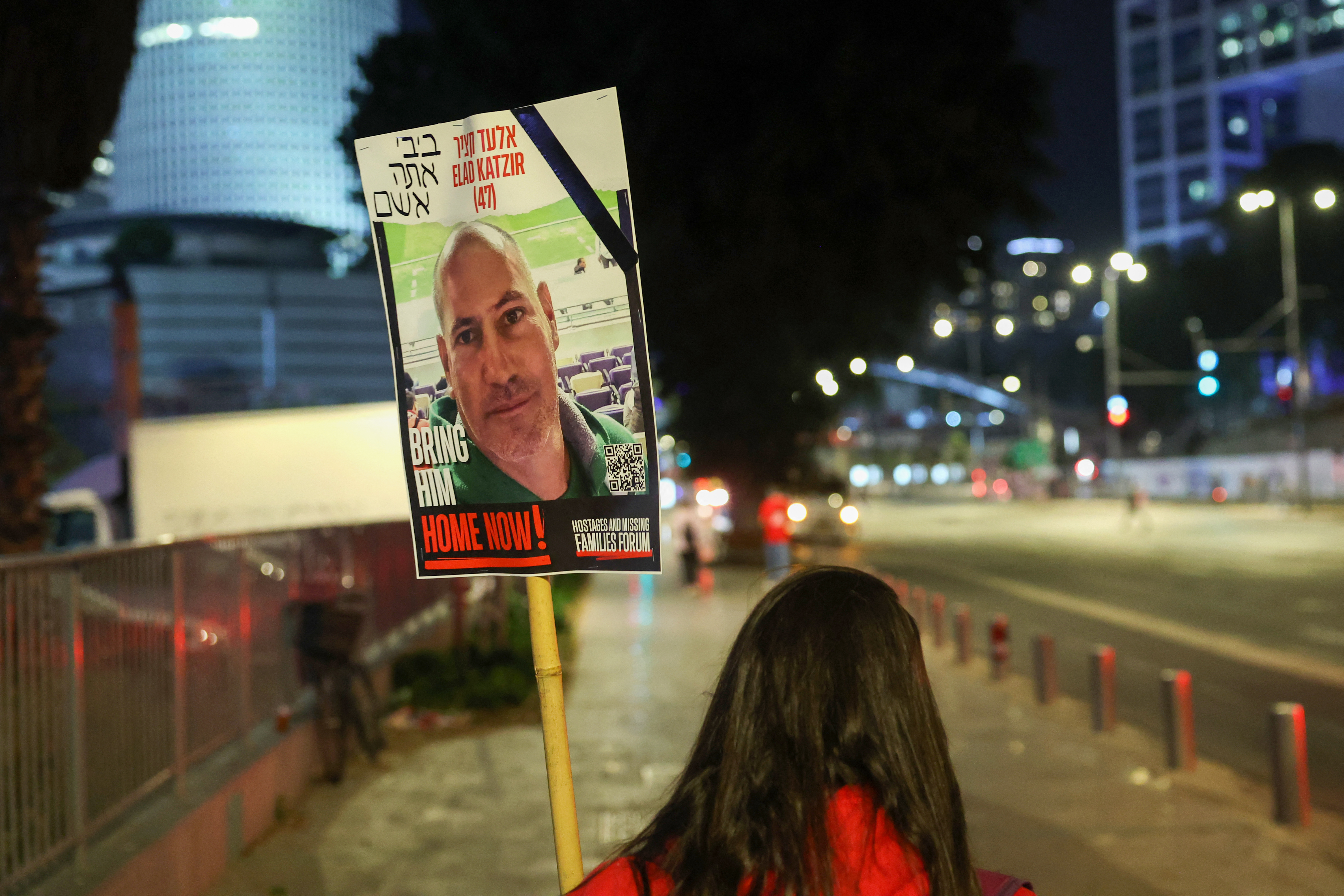
The family of Israeli hostage Elad Katzir, who the Israeli military says was likely killed in January, said he might be alive today if a ceasefire-hostages deal had been struck.
Katzir's body was rescued overnight from Khan Younis and returned to his family in Israel following identification procedures, according to an earlier joint statement by the Israel Defense Forces (IDF) and the Israeli Security Agency (ISA).
He "could have been saved if a deal had happened in time," Carmit Katzir, his sister, said at a small rally held in Tel Aviv on Saturday.
Katzir's body was rescued overnight from Khan Younis and returned to his family in Israel following identification procedures, according to an earlier joint statement by the Israel Defense Forces and the Israeli Security Agency. He was abducted from kibbutz Nir Oz by Palestinian Islamic Jihad militants on October 7. IDF spokesperson Daniel Hagari said Katzir was likely killed in January, according to Israeli intelligence.
"Our leadership is cowardly and driven by political considerations and that is why it did not happen. He might be recognized as a casualty of hostilities, but the exact term is casualty of acts of neglect," his sister said.
She made similar comments earlier Saturday on Facebook as well.
Katzir's body was recovered overnight from Khan Younis and returned to his family in Israel following identification procedures, according to an earlier joint statement by the Israel Defense Forces and the Israeli Security Agency. He was abducted from kibbutz Nir Oz by Palestinian Islamic Jihad militants on October 7.
IDF spokesperson Daniel Hagari said Saturday that Katzir was likely killed in January, citing Israeli intelligence.
"Katzir was murdered by his captors," Hagari said when he was asked whether Katzir was murdered and not shot by Israeli forces by mistake, adding that "we know this from a very credible piece of intelligence."
CNN is not able to independently confirm the information provided by Hagari.
Anti-government protesters in Israel call for Netanyahu's resignation and early elections
From CNN's Lauren Izso, Eugenia Yosef and Mohammed Tawfeeq
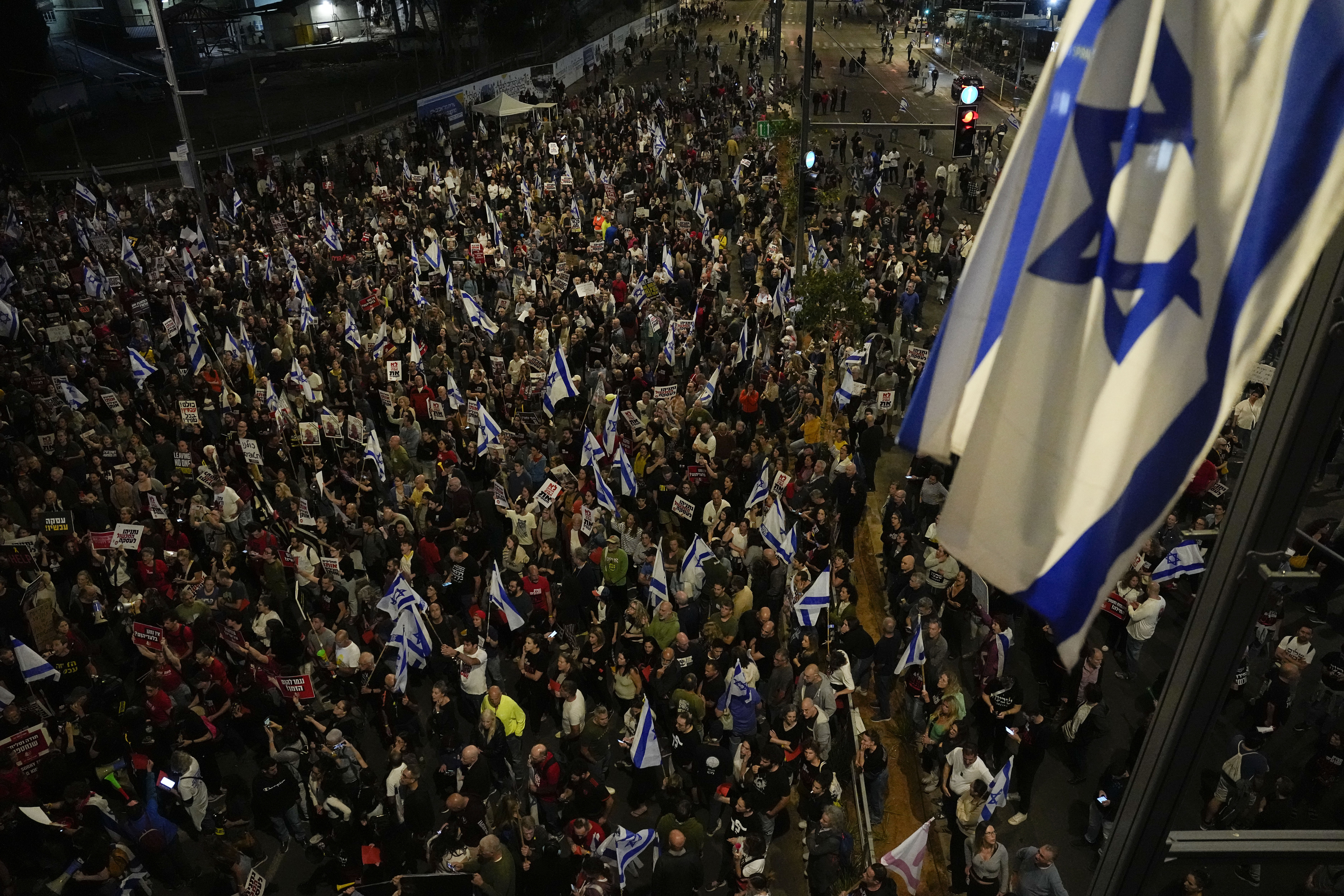
Protesters once again took to the streets of Tel Aviv, Caesarea and Haifa on Saturday, demanding the resignation of Israeli Prime Minister Benjamin Netanyahu and early elections.
Demonstrators also called for the release of all Israeli hostages held in Gaza ahead of the six-month mark of hostilities.
Many people waved Israeli flags and held up signs with images of hostages, calling on the government to bring them home alive.
In Tel Aviv, protesters were heard chanting:
"We are not afraid; you destroyed the country, and we will fix it. We want them (hostages) back alive and not in coffins."
Other protesters were seen by a CNN team on the ground holding flags and banners, with one reading, "The government that destroyed the country and tore the nation apart."
Another banner called for the "division of religion and state," and one stated that "Netanyahu is dangerous to Israel."
Protesters in Haifa called the government a failure, saying Netanyahu is "guilty, guilty, guilty."
"Elections now!" read one banner held by a protester.
Analysis: Israel has no exit strategy and no clear plan for the future after 6 months of war in Gaza
Analysis by CNN's Ivana Kottasová
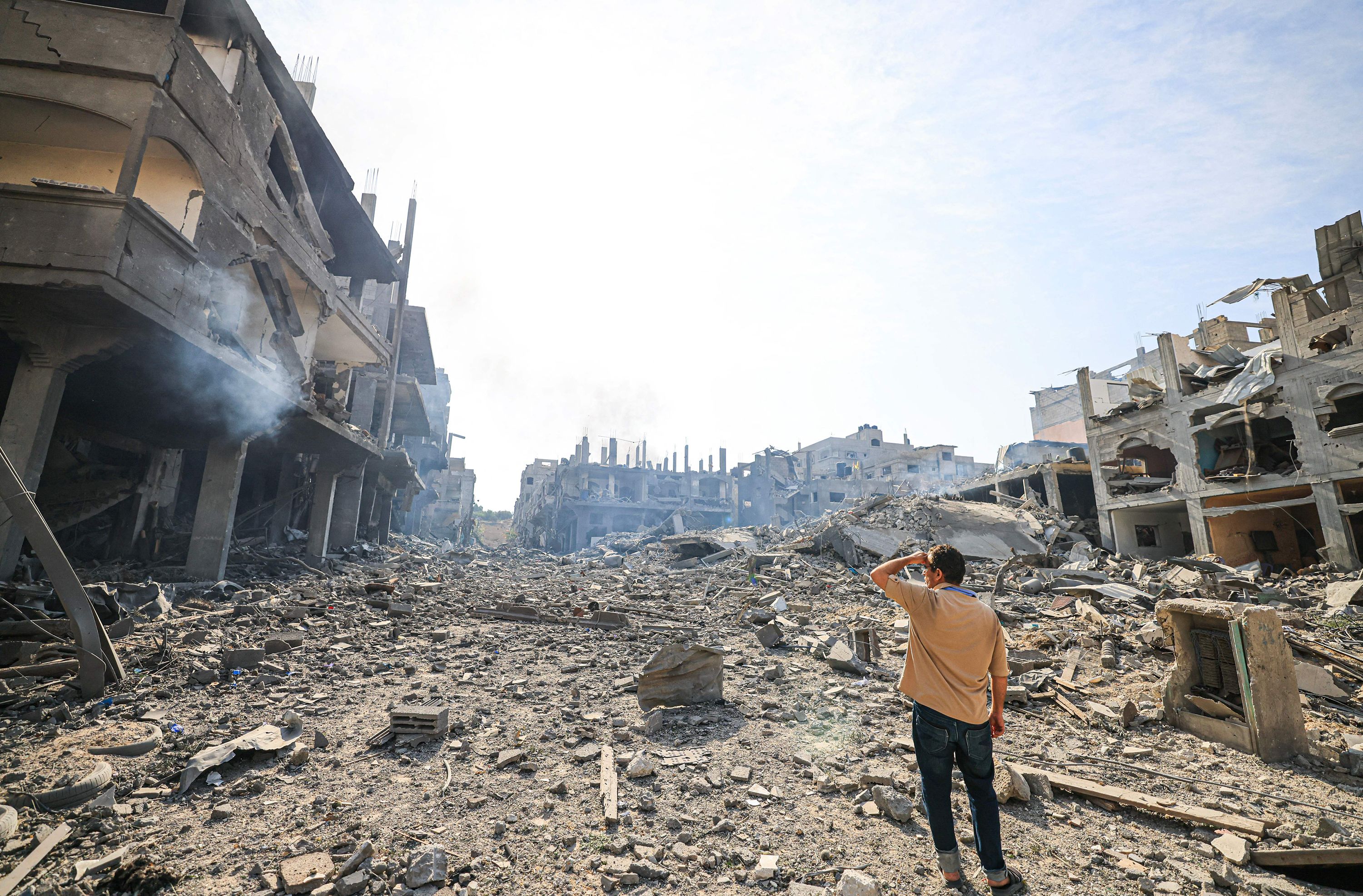
The war in Gaza has been raging for six months and the patience of Israel’s allies is running out. As the death toll in the enclave continues to climb, it’s becoming increasingly clear that Israel has no viable plan for how to end the war or what comes next.
The determination to continue pursuing Hamas in Gaza despite the horrific humanitarian consequences is leaving Israel increasingly isolated on the global stage, with its government facing pressure from all sides.
Multiple international organizations have warned Israel may be committing genocide, and even the country’s closest allies are now openly criticizing Prime Minister Benjamin Netanyahu. Calls to halt arms shipments to Israel are growing in the United States and the United Kingdom.
At the same time, Netanyahu and his government are under mounting pressure at home, with protesters back on the streets in large numbers calling for his resignation.
Israel launched the war immediately after the deadly October 7 terror attacks by Hamas. At that time, the Israeli government said the operation had two goals: eliminating Hamas and bringing back the hostages taken by the militants to Gaza.
Six months into the conflict, neither goal has been reached.
What to know about the Israeli strike on Iran's embassy in Syria, as top general vows revenge
From CNN staff
Speaking from a funeral procession Saturday for a slain military officer, Iran's highest-ranking commander vowed that an Israeli strike on its embassy complex in Damascus will not go unanswered.
The remarks come as the US braces for a significant Iranian attack on US or Israeli assets in the Middle East, according to a senior administration official.
The situation once again underlines fears that the war in Gaza could spread into a broader regional conflict.
Here's what to know:
- The strike killed at least seven Iranian officials in Syria on Monday: Among them were Mohammed Reza Zahedi, a top commander in Iran’s Islamic Revolutionary Guard Corps, whose funeral was held today. The airstrike destroyed the Iranian consulate building in the Syrian capital of Damascus and also killed at least six Syrian citizens, according to Iranian state TV. An Israel Defense Forces spokesperson told CNN this week that intelligence showed the building was not a consulate but “a military building of Quds forces disguised as a civilian building.”
- The attack dealt a significant blow to Iran's military: Zahedi — a former commander of the IRGC’s ground forces and air force, and the deputy commander of its operations — is the most high-profile Iranian target killed since the US assassination of IRGC Gen. Qassem Soleimani in Baghdad in 2020. At least one other senior commander was among those killed, according to Iran's foreign ministry.
- Tehran has vowed to respond: Maj. Gen. Mohammad Bagheri, the chief of staff of Iran's military, said Saturday that the Damascus strike "won’t remain unanswered,” according to Iran's semi-official news outlet Tasnim. His remarks follow similar vows by Iran's supreme leader and its president.
- The US says it was uninvolved: The US was quick to tell Iran that the Biden administration was not involved and had no advance knowledge of Monday’s strike on the embassy. It has warned Iran against coming after American assets. Nonetheless, Bagheri said Saturday that Washington bears the "main responsibility" for the Damascus attack. He has previously said the US supply of weapons to Israel makes it complicit in its ally's attacks.
- Washington is bracing for retaliation: The US is on high alert and actively preparing for a “significant” attack by Iran that could come as soon as the coming week, targeting Israeli or American assets in the region, a senior administration official tells CNN. Senior US officials believe an attack by Iran is “inevitable,” the source said.
- How this ties back to the war in Gaza: Israel's ongoing conflicts with Iran and its proxy groups — like the Houthis in Yemen and Hezbollah in Lebanon — have intensified since the October 7 attacks by Hamas, which is also backed by Tehran. Israel has carried out numerous strikes on Iran-backed targets in Syria, but the targeting of the embassy itself marks a significant escalation. Iran's response could further escalate the already tumultuous situation in the Middle East.
Israeli opposition leader will meet with senior US government officials during Washington visit
From CNN's Eugenia Yosef
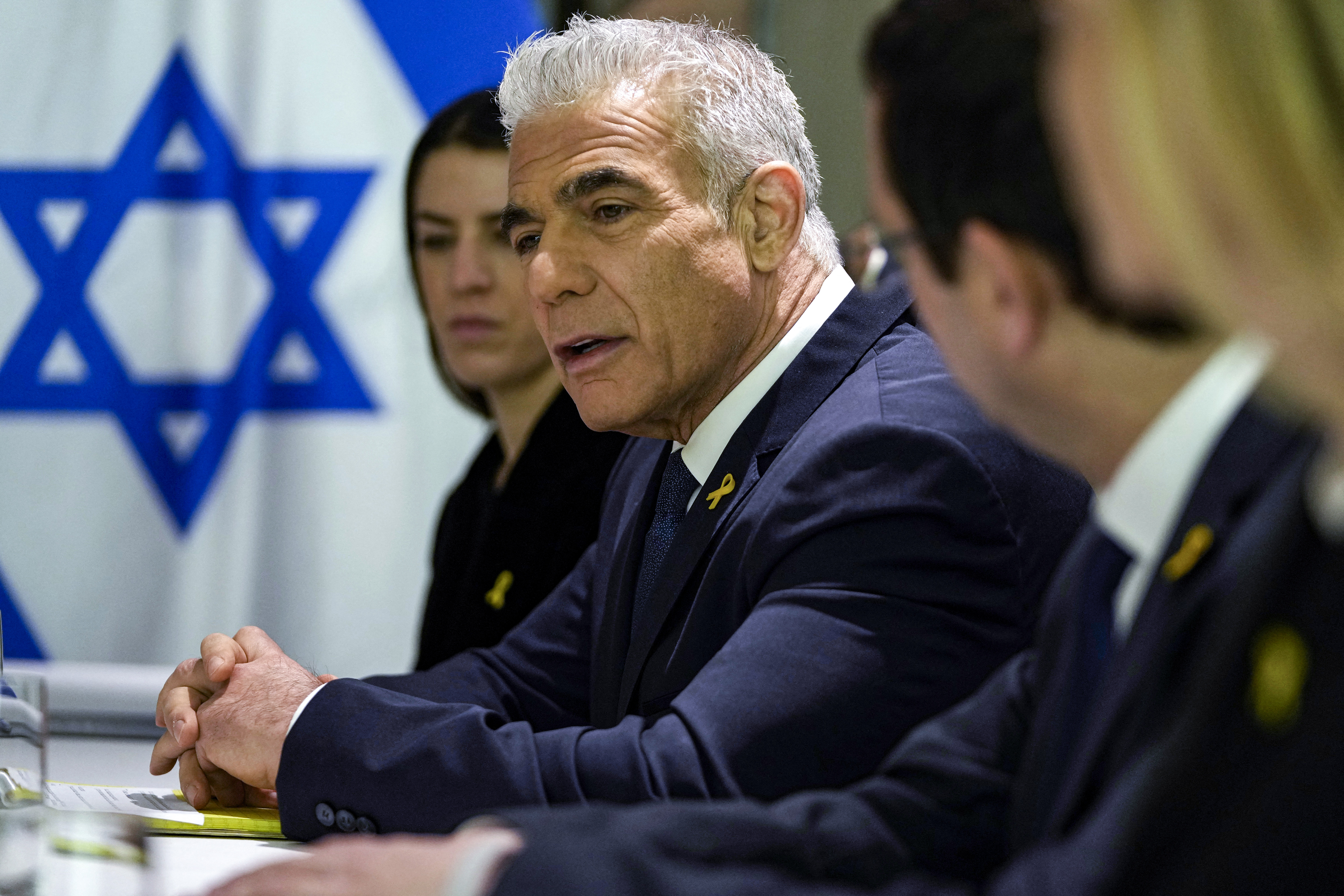
Israeli opposition leader Yair Lapid will meet with top US government officials in the White House and State Department, as well as senior Democratic and Republican senators, during his visit to Washington.
Lapid will leave for the US tonight, according to a Telegram post from his office on Saturday.
According to the post, Lapid will meet with US Secretary of State Antony Blinken and US national security adviser Jake Sullivan, as well as Senate Foreign Relations Committee chairman Sen. Ben Cardin, Senate Majority Leader Chuck Schumer, and South Carolina Republican Sen. Lindsey Graham.
On Wednesday, Lapid called for Israel's current government to resign, after Israeli war cabinet minister Benny Gantz — also a main political rival of Prime Minister Benjamin Netanyahu — urged for parliamentary elections in September.


